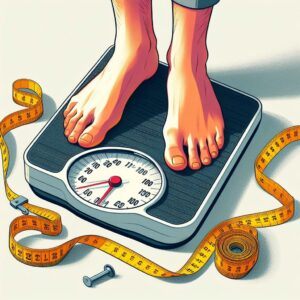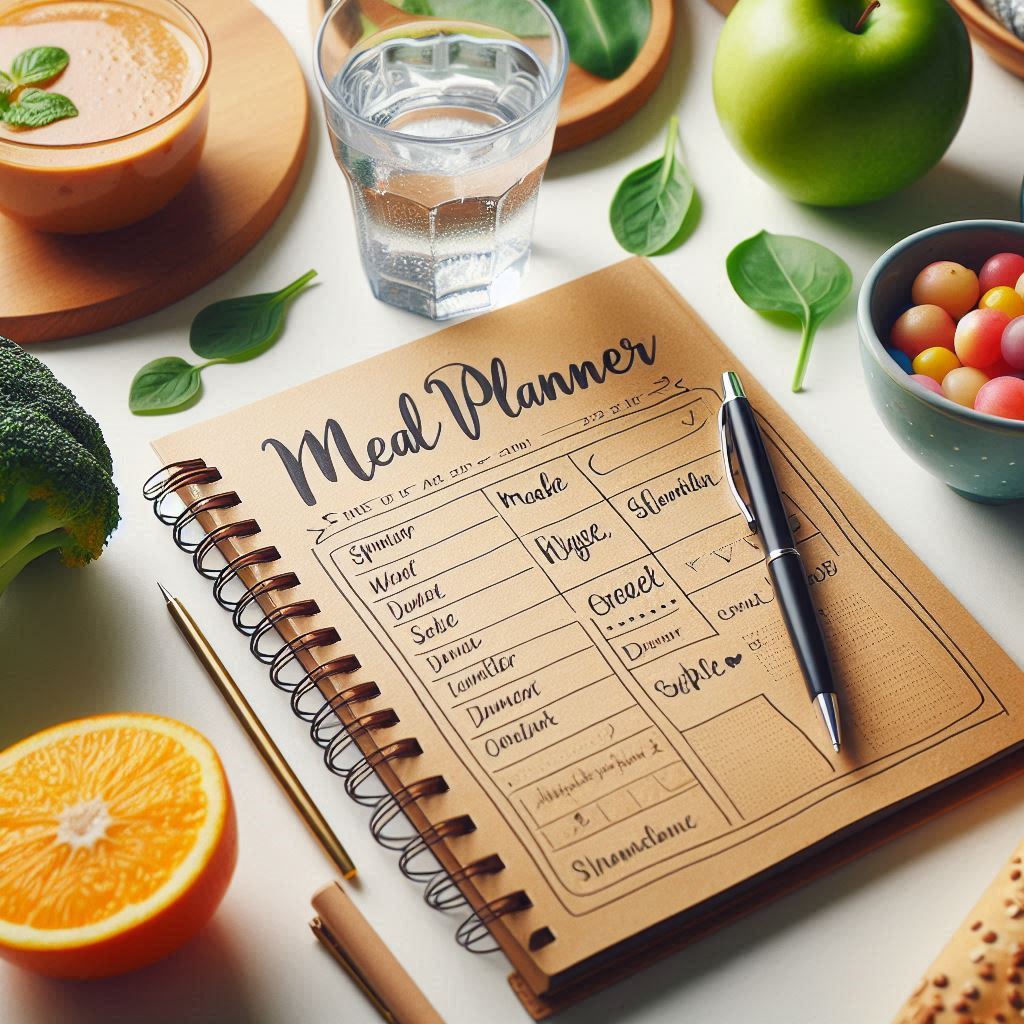 Nutrition and weight loss rely on a key concept: energy balance. It’s about the calories you take in versus the ones you burn. However, the type of food you eat matters a great deal too. A calorie isn’t just a calorie when considering its impact on your body’s hormones and metabolism.
Nutrition and weight loss rely on a key concept: energy balance. It’s about the calories you take in versus the ones you burn. However, the type of food you eat matters a great deal too. A calorie isn’t just a calorie when considering its impact on your body’s hormones and metabolism.
I’m here to address a few myths that might be holding you back. No, you don’t need to starve or eat only salads to lose weight. What’s essential is taking a balanced, sustainable approach to dieting that prioritizes your well-being.
At the foundation of weight loss is recognizing that your body is a complex system. It deserves care that reflects its intricacies—meaning I recommend an approach that encompasses nutritional balance, regular physical activity, and catered lifestyle changes.
Determining Your Weight Loss Goals
Before you jump into any nutrition plan, it’s crucial to define what you’re aiming to achieve. Weight loss isn’t just about shedding pounds; it’s about doing so in a way that promotes overall health and well-being. This section helps you establish practical goals for your weight loss journey.
Start by getting to know your Body Mass Index (BMI). Although BMI isn’t a perfect metric, it offers a baseline for categorizing weight concerning height, guiding you toward a target weight range. Remember, your goal should be to attain a weight that is healthful for you, taking into account factors like muscle mass and bone density that BMI does not.
Once you have a target weight range in mind, tailor your nutrition plan to fit your daily routines and preferences. It shouldn’t feel like an inconvenience but rather a seamless part of your life. It’s also worth noting that the mental aspect of losing weight is just as important as the physical; being in the right frame of mind can dramatically influence your success.
Armed with clear goals and the right mindset, you’re now ready to look into the core components that make up a successful nutrition plan. In the next section, I’ll guide you through the essential elements of nutrition, breaking down the benefits of macronutrients, vitamins, and minerals, and why they’re crucial in your diet as you work toward your weight loss goals.
What Is the Best Weight Loss Food Plan?

When embarking on a weight loss journey, a successful nutrition plan is like a trustworthy road map. It’s the guide that shows you how to reach your destination effectively. To create this map, focus on a balanced intake of macronutrients. Proteins, carbohydrates, and fats each play distinctive roles in your body and should be consumed in appropriate proportions. The right balance supports muscle maintenance, energy levels, and overall health.
Don’t overlook the less-talked-about heroes: vitamins and minerals. These nutrients facilitate critical functions in your body, and deficiencies can derail your weight loss efforts. Think of them as the nuts and bolts in your weight loss machinery, essential for keeping the system running smoothly.
Fiber is another crucial element often missed in diet talks. It helps in feeling full longer and managing blood sugar levels, both imperative for curbing unnecessary snacking. Hydration goes hand-in-hand with fiber; water is fundamental for processing nutrients and keeping hunger pangs at bay.
Another component that some may not consider is portion control. It’s easy to overeat, even healthy foods, which can sabotage weight loss. Understanding and managing portion sizes is vital. Meal timing also plays a role. Eating at regular intervals can manage hunger and maintain a steady metabolism.
Remember, a successful nutrition plan isn’t just about rigid rules; it’s about creating a sustainable, enjoyable eating pattern that supports your weight loss and overall well-being.
How Do I Create a Nutrition Plan for Weight Loss?

No one-size-fits-all solution exists when it comes to losing weight. Your tastes, lifestyle, dietary restrictions, and even work schedule should direct the development of your nutrition plan. Here’s how you can tailor a plan that resonates with you.
Start by analyzing your food preferences. Love fruits? Make them a mainstay in your snacks. Can’t stand broccoli? Don’t force it; there are plenty of vegetables to choose from. Respect your food likes and dislikes; they’re central to creating a sustainable plan.
Diversity in your diet prevents boredom and nutritional gaps. Rotate your proteins, experiment with different whole grains, and add a rainbow of vegetables to your plate. Moderation is key, so enjoy occasional treats wisely within your calorie budget.
Meal planning isn’t just a strategy; it’s your roadmap to success. Plan your weekly meals, including what you’ll cook and when. Having a strategy in place reduces the temptation to grab unhealthy options and helps manage portion sizes.
Don’t let dining out derail your plan. Research restaurant menus in advance, opt for healthier dishes, and don’t shy away from customizing your order. Remember, your diet doesn’t stop when you leave the house.
A successful nutrition plan isn’t rigid. Allow for flexibility. Craving something sweet? Adjust your plan to include a small piece of dark chocolate. Are friends inviting you out? Decide ahead of time how you’ll handle social eating. Planning is important, but adaptability helps you stick with it long-term.
Monitoring Progress and Making Adjustments
![]()
Losing weight is not just about the initial excitement of changing your diet; it’s about the ongoing process of monitoring your progress and being ready to make adjustments. This kind of vigilance is crucial.
Keep a close eye on your nutrition intake and your weight trends over time. Use a food diary or an app if that helps you stay on track.
Remember, it’s normal to hit a plateau. Your body is adapting, and sometimes, weight loss stalls as a result. Don’t get discouraged. This is just a signal to reassess your plan.
When you do hit a plateau, look over your food logs and activity levels. It’s often a sign that it’s time to make some changes. You might need to cut more calories or add more exercise.
Pay attention to what your body tells you. If you’re constantly hungry or fatigued, your diet might be too restrictive. On the flip side, if you’re not losing weight, you may be more lenient with your calorie intake than you realize.
Achieving your ideal body weight is a dynamic process. Effective adjustment of your nutrition plan will depend on accurate self-monitoring and a willingness to change course as needed.
Sustainable Practices for Long-Term Weight Management
I know reaching your target weight feels fantastic, but the journey doesn’t end there. Long-term weight management is the real victory. Let’s talk about turning short-term success into a long-lasting lifestyle.
Regular exercise is a cornerstone of keeping the weight off. More than just burning calories, it’s about creating a body that’s efficient and strong. Pick activities you love, so it never feels like a chore.
The habits that got you to your goal weight are your new best friends. Keep them close. Gradual changes stack up, leading to big results over time. Consistency is what transforms a diet into a way of life.
No journey is without its bumps, and setbacks happen. Here’s the kicker: they’re not failures, they’re lessons. Learn from them, forgive yourself, and keep moving forward.
When the weight loss phase is over, you’re not going back to the start line. You’re leveling up to maintenance mode. It’s less about the scales and more about balance. Listen to your body, it’s the best guide you’ll ever have.
Remember, weight management isn’t a sprint; it’s a marathon. A healthy lifestyle is a lifelong commitment — an investment in your future self. So stand tall, be proud, and take each day as it comes, one healthy choice at a time.
Ready to Reprogram Your Body? Free Hypnosis for Weight Loss Awaits!
References:
- Hall, K. D., et al. (2012). “Effect of energy imbalance on body weight.” *The Lancet*.
- Hill, J. O., & Peters, J. C. (1998). “Environmental factors in the obesity epidemic.” *Science*.
- Ross, A. C., et al. (2011). “Calcium and vitamin D intake.” *Institute of Medicine*.
- Rolls, B. J., et al. (2004). “Portion size and energy intake.” *American Journal of Clinical Nutrition*.
- Wing, R. R., & Phelan, S. (2005). “Long-term weight loss maintenance.” *American Journal of Clinical Nutrition*.

